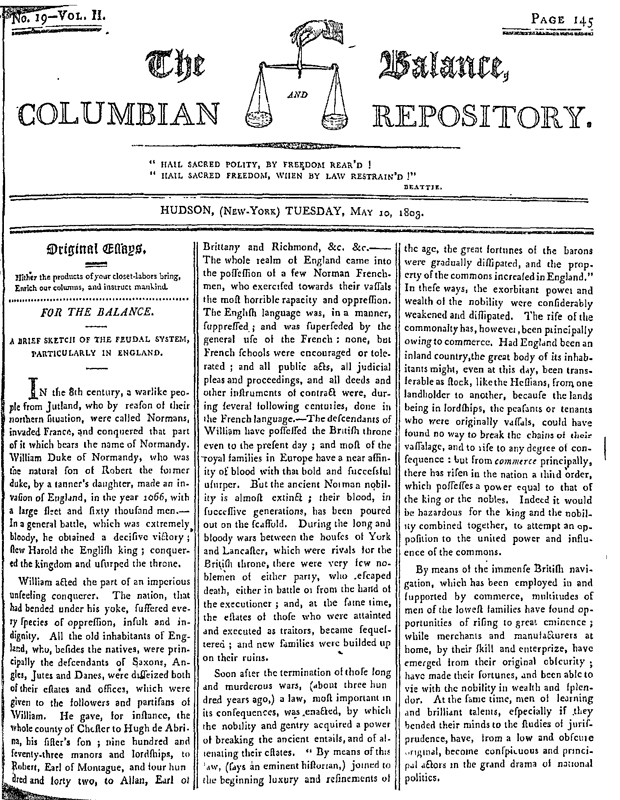The Balance, 10 May 1803

The Balance of May 10, 1803, reprints an article purportedly from The Charleston Courier,[1] which misattributes a section of John Adams' Thoughts on Government (1776), as an extract of a letter from Thomas Jefferson to "Judge Wythe of Virginia."
Adams began composing his famous pamphlet in March of 1776, as a pair of letters addressed to William Hooper[2] and John Penn,[3] delegates to the Second Continental Congress from North Carolina. At the request of George Wythe, Adams wrote out a third copy,[4] and then a fourth for Jonathan Dickinson Sergeant of New Jersey. Wythe's copy was borrowed by Richard Henry Lee and taken to John Dunlap, a printer in Philadelphia, who published it as Thoughts on Government, Applicable to the Present State of the American Colonies. In a Letter from a Gentleman to His Friend.[5]
Paul L. Ford cites The Balance article as a genuine fragment of a Jefferson letter in his Writings of Thomas Jefferson (1893).[6]
Article text, 10 May 1803
Page 146
Political.
FROM THE CHARLESTON COURIER.
IT would take a long and laborious life, to collect into one mass, and display in their true colours, the endless inconsistencies and contradictions of the anti-federal politicians and advocates. Here they are found parading in fine robes, borrowed from the federal party when in office—there we see them strutting in their own dowlas[7] and tinsel. Here contradicting evident matter of fact, there contradicting themselves. Yesterday affecting that black is white, to-day that white is black. Now denying to the late administration the smallest particle of merit—again, in the eagerness and impetuosity of self-applause, confessing what they so denied.
But this inconsistency in inferior agents is harmless, when compared with that displayed by the leading man of the country. The people of America are so well acquainted with the sentiments of our President, and his partizans in the senate, on the subject of the judiciary system, that it would useless trespass on the time of our readers to repeat them: They have seen that judiciary receive a severe wound; they have seen its right in question and denied; and a majority of the Legislature deciding in conformity to the arguments and principles of those who denied it. Now let them compare those opinions with the principles laid down in 1776 by our President himself—(then plain Mr. Jefferson)—in a letter to Judge Wythe, of Virginia, written in reply to one from that Judge to him, when the Constitution was forming.
THE EXTRACT.
"The dignity and stability of government in all its branches, the morals of the people, and every blessing of society, depend so much upon an upright and skilful administration of justice, that the judicial power ought to be distinct from both the legislature and executive, and independent upon both, that so it may be a check upon both, as both should be checks upon that. The judges, therefore, should always be men of learning and experience in the laws, of exemplary morals, great patience, calmness and attention; their minds should not be distracted with jarring interests; they should not be dependent on any man, or body of men. To these ends they should hold estates for life in their offices, or, in other words, their commissions should be during good behavior, and their salaries should be ascertained and established by law."
"For misbehavior, the grand inquest of the colony, the house of representatives, should impeach them before the governor and council, when they should have time and opportunity to make their defence; but if convicted, should be removed from their offices, and subjected to such other punishment as shall be thought proper."
TH: JEFFERSON[8]
Now how is this change of opinion to be accounted for? Was Mr. Jefferson so young and inexperienced in 1776, that he was incapable of making up his mind upon principles? Certainly not—and that opinion of his, is a proof of it; for so far as it goes, it is just one; indeed so just that he could hardly look into a book upon the subject of constitutional rights, where same principle is not laid down. Then what can it be, but a determination to make every principle bend to the purposes of party, and to his political designs? The people will know what value to set upon men who can thus play fast and loose with principles, as it suits their convenience, and answers their private views.
See also
External links
- Thoughts on Government, The Papers of John Adams, vol. 4, Massachusetts Historical Society.
References
- ↑ "Political, from the Charleston Courier," Balance, and Columbian Repository, May 10, 1803, 146.
- ↑ Adams to William Hooper, before 27 March 1776, The Papers of John Adams, vol. 4, Massachusetts Historical Society.
- ↑ Adams to John Penn, before 27 March 1776, The Papers of John Adams, vol. 4, Massachusetts Historical Society.
- ↑ Thoughts on Goverment, The Papers of John Adams, vol. 4, Massachusetts Historical Society.
- ↑ Editorial Note, The Papers of John Adams, vol. 4, Massachusetts Historical Society; Adams tells the story of the pamphlet's composition in a letter to James Warren, 20 April 1776.
- ↑ Paul Leicester Ford, ed., The Writings of Thomas Jefferson, vol. 2, 1776-1781 (New York: J.P. Putnam's Sons, 1893), 59. We forgive Mr. Ford his error, because he did not have the capability of simply Googling the text, like we did.
- ↑ A coarse linen cloth used widely in the 16th and 17th centuries, chiefly for aprons, pocketing, soldiers' gaiters, linings and overalls.
- ↑ This article, or the article it is excerpted from, misattributes this text as a letter from Thomas Jefferson.